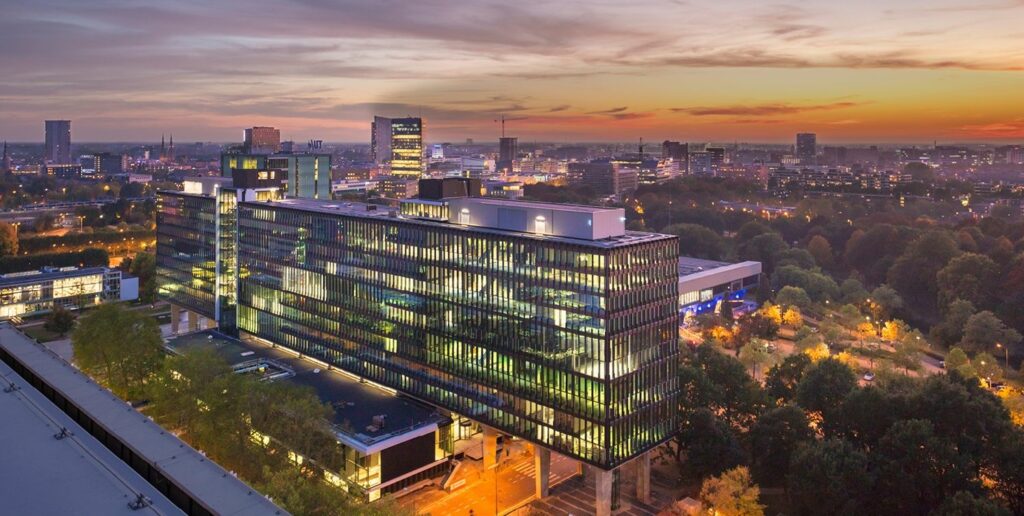
Job description
Research project description
District heating systems need to be further developed to decrease grid losses and exploit synergies, thereby increasing the efficiencies of production units. Moreover, district heating networks are becoming more complex due to, e.g., the variety of renewable generation systems and/or user demand profiles, lower distribution temperatures, the integration of heat storage for peak shaving, the usage of the network for both heating and cooling, and so forth. These next-generation networks (4GDH and 5GDH) are therefore much more difficult to design and, once in the ground, much more difficult to control compared to the conventional networks (3GDH). Therefore, the following project goals are defined.
- You will support decision makers, e.g., local governments, in developing and designing new district heating networks (5GDH).
- You will support the district heating operators in optimizing district heating control strategies (5GDH).
Job description
The main objective of this project is to develop (fit-for-purpose) modeling methods for the design and control of 5GDH networks.
- You will first focus on the (further) development of a full-order first-principles model for district heating and cooling networks, which (i) is highly accurate in both space (at building and neighborhood level) and time (at minute level) and (ii) is experimentally validated.
- This full-order model can subsequently be used by you for the generation of training and validation data for reduced-order data-driven models from which to develop fit-for-purpose models for design and control.
This position and research project are made possible by the BEHeaT program initiated by the Eindhoven Institute for Renewable Energy Systems (EIRES). EIRES facilitates the collaborative development and swift deployment of new technologies and devices by bringing together TU/e researchers working on materials, systems, and processes for energy storage and conversion.
EIRES consists of collaborating research groups within TUe. These include over 140 researchers and more than 450 PhDs. EIRES brings these researchers together and creates new network connections between researchers and industry.
Within the focus area of energy transition in the built environment, a large-scale research program was recently launched. This program, BEHeaT, stands for Built Environment Heat Transition. The program is funded with TUe’s own resources as well as contributions from industry. The research program has a pragmatic approach.
Within the BEHeaT program, research is conducted into the (further) development of various (new) materials, components and/or systems in relation to intelligent buildings, heat storage, heat networks and/or electricity grids. The focus is not only on physical materials, components and systems, but also on dynamic (predictive) models. We believe that in order to have impact, any research must take systems integration as its starting point. In addition, we believe that technology does not stand alone and should always be seen in relation to the (end) user. In this way, the impact of research results is increased.
Job requirements
- Motivated researcher, with a PhD in Applied Mathematics, Physics, Mechanical Engineering or Built Environment.
- The ideal candidate would have experience in research on fluid mechanics and heat transfer and experience with numerical modeling using CFD and/or programming with MATLAB and/or PYTHON.
- Ability to conduct high quality academic research, reflected in demonstratable outputs.
- A team player who enjoys coaching
PhD andMaster’s students and working in a dynamic, interdisciplinary team. - A proven ability to manage complex projects to completion on schedule.
- Excellent (written and verbal) proficiency in English, good communication skills.
- Independent and responsible.
- Can-do mentality
Conditions of employment
- A meaningful job in a dynamic and ambitious university, in an interdisciplinary setting and within an international network. You will work on a beautiful, green campus within walking distance of the central train station. In addition, we offer you:
- Full-time employment for 2 years.
- Salary in accordance with the Collective Labour Agreement for Dutch Universities, scale 10
- A year-end bonus of 8.3% and annual vacation pay of 8%.
- High-quality training programs on general skills, didactics and topics related to research and valorization.
- An excellent technical infrastructure, on-campus children’s day care and sports facilities.
- Partially paid parental leave and an allowance for commuting, working from home and internet costs.
- A TU/e Postdoc Association that helps you to build a stronger and broader academic and personal network, and offers tailored support, training and workshops.
- A Staff Immigration Team is available for international candidates, as are a tax compensation scheme (the 30% facility) and a compensation for moving expenses.
Information and application
About us
Eindhoven University of Technology is an internationally top-ranking university in the Netherlands that combines scientific curiosity with a hands-on attitude. Our spirit of collaboration translates into an open culture and a top-five position in collaborating with advanced industries. Fundamental knowledge enables us to design solutions for the highly complex problems of today and tomorrow.
Information
Do you recognize yourself in this profile and would you like to know more?
Please contact dr. C.C.M. Rindt (c.c.m.rindt[at]tue.nl) and/or dr. P. Hoes (p.hoes[at]tue.nl)
Visit our website for more information about the application process or the conditions of employment. You can also contact HR Services at HRServices.Gemini[at]tue.nl.
Are you inspired and would like to know more about working at TU/e? Please visit our career page.
Application
We invite you to submit a complete application using the apply-button.
The application should include a:
- Cover letter in which you describe your motivation and qualifications for the position.
- Curriculum vitae, including a list of your publications and the contact information of three references.
- List of five self-selected ‘best publications’.
We look forward to receiving your application and will screen it as soon as possible. The vacancy will remain open until the position is filled.





